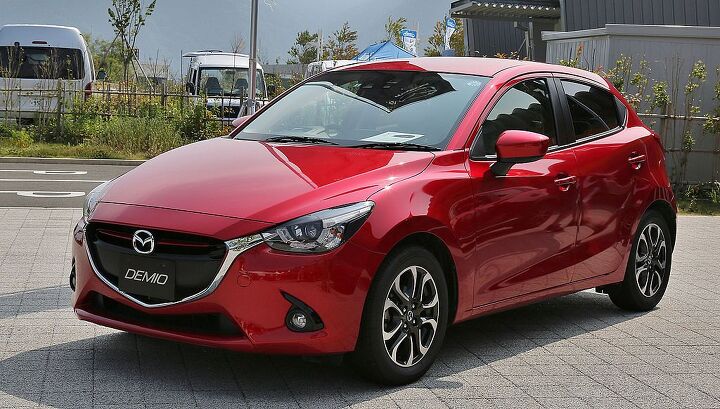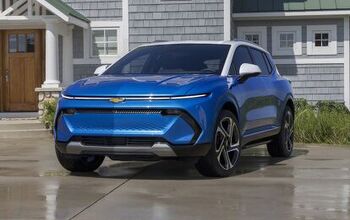Is the Toyota Yaris IA Getting a (Formerly Rejected) Sibling?

Three years ago, I stood in the Palais des congrès in Montreal as representatives from Mazda Canada introduced the next-generation Mazda 2, a model that never made it to either Canadian or American dealer lots. Well, not as a Mazda, anyway.
The 2015 Montreal International Auto Show debut of the KODO-ified little hatchback was hardly on the same level as, say, that of the next-gen Ram 1500 or Chevrolet Silverado or Ford Ranger we saw last week in Detroit. Still, the previous 2 endeared itself to buyers as a roomy, agile, and quirky little beast, and the redesigned model looked sharp. All good. Certainly, small cars weren’t nearly in as much danger from subcompact crossovers in 2015 as they are now.
So it was odd to see the model disappear from the future lineup on both sides of the border, only to return almost immediately as a Scion-badged sedan, the iA.
The one-car iA line, now sporting a Toyota badge, soldiers on alongside the existing three- and five-door Yaris — the Yaris that isn’t a Mazda — for the 2018 model year. But it’s in 2019 that things get confusing.
A VIN coding document sent to the National Highway Traffic Safety Administration from Mazda for the 2019 model year shows two Mexican-built iAs for the U.S. market — a four-door sedan and a five-door hatchback. In Puerto Rico, like in Canada, the Mazda 2 (aka Demio)-based sedan is known simply as the Yaris Sedan, positioned next to the Toyota-developed Yaris Hatchback. Neither jurisdiction sees iA badging.
Obviously, this raises a number of questions. Is Toyota planning to swap the existing five-door for one with a Mazda pedigree? Will the 2 hatch actually appear in North America (or at least the U.S.) four years after its launch? Surely, Toyota doesn’t plan to offer both hatchbacks in a shrinking segment.
Sadly, VIN docs haven’t yet been sent to the NHTSA from Toyota, so we can’t peer into that automaker’s 2019 lineup just yet.
No automaker likes detailing future models, and Toyota’s no different. When contacted by TTAC, the company stayed mum on the possibility of a new model joining the stable, though Toyota Motor North America product communications specialist Nate Martinez did say in a late Friday email, “we can confirm there are no plans for the discontinuation of our current Yaris five-door.”
Confused yet? There’s a number of ways to interpret this statement, and we’ll update you as we glean more information. Certainly, it looks like the existing three-door Yaris is endangered. It’s also possible a Mazda-based hatch might appear only in a certain market, but that’s enough speculation for now.
The existing Yaris lineup performed well in the U.S. in 2017, though the same can’t be said for the non-iA hatchback. Yaris hatch sales sank 73.3 percent in December to just 203 vehicles, with year-to-date volume down 20.4 percent. The Yaris iA, however, enjoyed a 27.7 percent sales boost in 2017.
As the significantly higher-performing model in the lineup (35,727 sales versus the hatch’s 8,653), iA sales lifted the Yaris lineup to a 14.2 percent volume increase last year.
[Image: Toyota]

More by Steph Willems
Latest Car Reviews
Read moreLatest Product Reviews
Read moreRecent Comments
- Kwik_Shift_Pro4X I will drive my Frontier into the ground, but for a daily, I'd go with a perfectly fine Versa SR or Mazda3.
- Zerofoo The green arguments for EVs here are interesting...lithium, cobalt and nickel mines are some of the most polluting things on this planet - even more so when they are operated in 3rd world countries.
- JMII Let me know when this a real vehicle, with 3 pedals... and comes in yellow like my '89 Prelude Si. Given Honda's track record over the last two decades I am not getting my hopes up.
- JMII I did them on my C7 because somehow GM managed to build LED markers that fail after only 6 years. These are brighter then OEM despite the smoke tint look.I got them here: https://www.corvettepartsandaccessories.com/products/c7-corvette-oracle-concept-sidemarker-set?variant=1401801736202
- 28-Cars-Later Why RHO? Were Gamma and Epsilon already taken?



































Comments
Join the conversation
Relatively speaking, this segment is dead. 352,000 subcompacts sold in the US last year. The Versa and the Accent were over 50% of that volume- leaving everyone else to divide up what was left. Compare that number to the 2,000,000 compacts sold or the 1,800,000 mid-sizes sold.
They've already been selling the hatch as the 2 in the US for years, but only in Puerto Rico. How did you mention that this Yaris iA is the Yaris sedan in PR and not notice that they actually sell the Mazda 2 there already? That would explain the VINs and this entire article, and you're at least a year or two late. http://www.mazdapr.com/mazda-2/